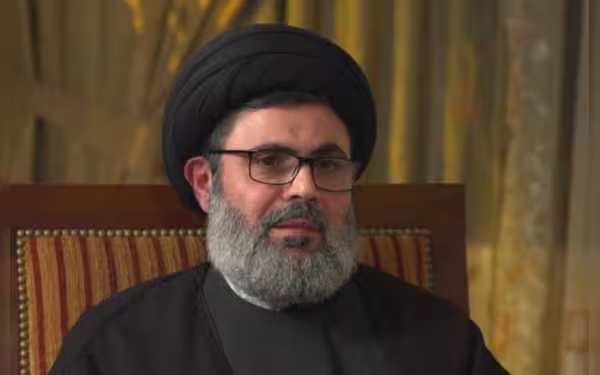Friday, November 8, 2024 10:41 AM
Hashem Safieddine: Likely Successor to Hezbollah Leader Nasrallah
- Hashem Safieddine emerges as potential Hezbollah leader.
- Safieddine's ties to Iran strengthen his candidacy.
- Hezbollah's leadership transition remains a critical issue.
 Image Credits: arabnewspk
Image Credits: arabnewspkHashem Safieddine is seen as the likely successor to Hezbollah's Hassan Nasrallah, with significant implications for the group's future.
In the complex landscape of Middle Eastern politics, the potential succession of leadership within Hezbollah is a topic of significant interest. As the current leader, Hassan Nasrallah, continues to guide the organization, discussions about who might take the reins in the future have intensified. One name that frequently arises in these conversations is Hashem Safieddine, a prominent figure within Hezbollah and a cousin of Nasrallah.
Hashem Safieddine, who is believed to be in his late 50s or early 60s, shares a striking resemblance to Nasrallah, both in appearance and in their deep-rooted connections to the Shiite Muslim movement. His ties to Iran, the group’s primary supporter, further bolster his candidacy for leadership. A source close to Hezbollah has indicated that Safieddine is the "most likely" candidate to succeed Nasrallah when the time comes.
In 2017, both the United States and Saudi Arabia designated Safieddine as a "terrorist," highlighting the international scrutiny surrounding him. The U.S. Treasury has referred to him as "a senior leader" and "a key member" of Hezbollah’s executive, underscoring his significant role within the organization. While Hezbollah’s deputy chief, Naim Qassem, would temporarily assume leadership following Nasrallah’s death, the Shoura Council, Hezbollah’s decision-making body, would ultimately elect a new secretary-general.
Safieddine’s educational background in religious studies in Qom, Iran, has solidified his standing within the group. His familial connections are also noteworthy; his son is married to the daughter of General Qasem Soleimani, the late commander of Iran’s Revolutionary Guards’ foreign operations, who was killed in a U.S. strike in 2020. This connection further intertwines Safieddine with the Iranian leadership.
Unlike Nasrallah, who has maintained a low profile for years, Safieddine has been more visible at political and religious events. His calm demeanor is often contrasted with the fiery rhetoric he displays during the funerals of Hezbollah fighters, particularly in light of the ongoing conflicts with Israel. Recently, he expressed solidarity with Palestinian Hamas militants, emphasizing Hezbollah’s commitment to the resistance.
Experts, such as Amal Saad from Cardiff University, have noted that Safieddine has long been viewed as a potential successor to Nasrallah. Saad remarked, "The next leader has to be on the Shoura Council, which has a handful of members, and he has to be a religious figure." She further stated that Safieddine "has a lot of authority... he’s the strongest contender," indicating the weight of his candidacy.
Hezbollah was established with the support of Iran’s Revolutionary Guards during the Lebanese civil war, gaining recognition as "the Resistance" for its efforts against Israeli forces in southern Lebanon. Safieddine’s recent remarks in July hinted at the organization’s approach to leadership transitions, stating, "In our resistance... when any leader is martyred, another takes up the flag and goes on with new, certain, strong determination." This statement reflects the resilience and continuity that Hezbollah aims to maintain, regardless of the challenges it faces.
As the political landscape in the region continues to evolve, the question of who will lead Hezbollah after Nasrallah remains a critical one. Safieddine’s potential rise to power could have significant implications for the group’s future direction and its relationship with both regional and global powers. Understanding these dynamics is essential for anyone interested in the ongoing developments in Middle Eastern politics.













